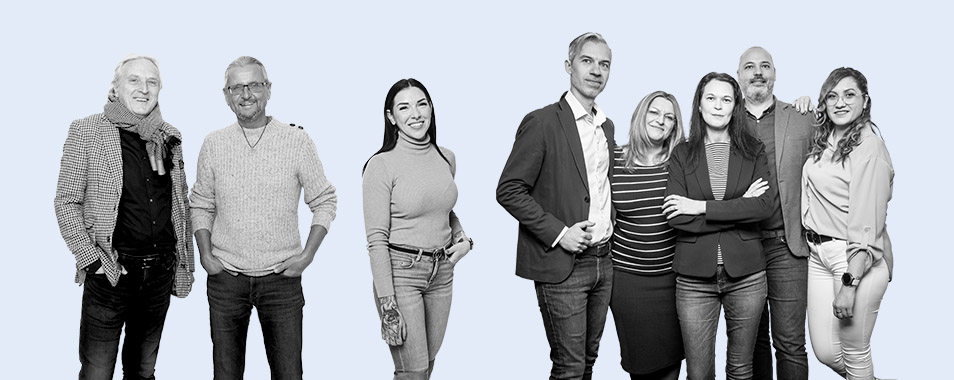
Diversity and inclusion
A community the size of ours at the UNIQA Group lives and breathes through diversity. We believe diversity can only be fully effective within an inclusive environment. If inclusion – consisting of policies, practices, ways of behaving and attitudes – is actively embraced, a diverse organisation will be able to harness its full potential.
Our “Diversity & Inclusion” (D&I) strategy published in 2022 is the basis for all our activities and is part of our UNIQA 3.0 programme for the future. It is clearly oriented towards our values, the Guiding Principles. In addition to a selection of initiatives, it also includes specific measurable targets focused on two areas, namely equal pay and women in management positions.
Equal pay for work of equal value: A standardised annual process has been established in Austria for evaluating, analysing and developing measures concerning the pay gap. With the help of this process, we have achieved a sustained reduction in the adjusted pay gap at the Austrian location (office staff) from 1.4 per cent in 2021 to 0.6 per cent in 2022 and 20231). In our core markets of Czechia, Slovakia, Poland, Hungary and Romania, an equal pay analysis was carried out for the first time in 2023, the results of which are awaiting validation.
More women in management positions2): With the aim of increasing the proportion of women in management positions in Austria, the Women’s Career Index was also evaluated in the 2023 financial year. Targeted and successfully implemented measures have boosted our score from 63 to 77 index points since the first evaluation in 2020/2021. Although this is still well below the external benchmark of 81 for financial services companies, it exceeded our 2023 internal target of 70 points. The measures taken include clear communication, the definition of measurable targets, guidelines for filling management positions and promotions, participation in relevant networks, flexible working models, an established mentoring programme and the implementation of models for job sharing and shared/part-time management. Despite an increase in the proportion of women in leading positions in Austria, the target of a 5 percentage point increase remained unachieved at just 2.3 percentage points, which has prompted us to continue focusing on this issue. No specific targets have been set for other locations.
|
2022 |
2023 |
||||||
|---|---|---|---|---|---|---|---|---|
Women in the entire workforce** |
57.8% |
57.9% |
||||||
Percentage of women among managers*** |
43.0% |
43.6% |
||||||
Percentage of women on the Management Boards of local companies |
27.1% |
26.3% |
||||||
Percentage of women on the Management Board |
0.0% |
11.1% |
||||||
Percentage of women on the Supervisory Board |
33.3% |
33.3% |
||||||
|
||||||||
Employee feedback counts: we essentially measure the success of our “Diversity & Inclusion” strategy by the way it is perceived by our employees. The UNIQA Inclusion Index is used for this3). Our goal was to increase the baseline score of 3.6 (on a 5-point scale) measured in Austria in 2021 to at least 3.8 by 2023. In Austria, the score rose to 3.9 in 2023.
Age diversity: Overall, the average age of our employees decreased slightly in 2023 compared to the previous year. Changes at management level were minimal, but the average age on the Management Boards in local companies dropped significantly.
|
Age diversity |
Age diversity |
Age diversity of Management Board members in local companies |
|||||
|---|---|---|---|---|---|---|---|---|
as of the reporting date 31 December. |
2022 |
2023 |
2022 |
2023 |
2022 |
2023 |
||
< 30 years old |
14.9% |
15.4% |
2.2% |
1.4% |
0.0% |
0.0% |
||
30 – 50 years old |
57.8% |
58.5% |
67.9% |
68.9% |
66.1% |
70.2% |
||
> 50 years old |
27.2% |
26.1% |
29.9% |
29.7% |
33.9% |
29.8% |
||
|
||||||||
Topic |
Target achievement in 2023 |
2024 targets |
||
|---|---|---|---|---|
Equal pay for work of equal value |
In 2023, the adjusted gender pay gap for office staff in Austria was 0.6 per cent for the second time in a row – a significant decrease compared to the 1.4 per cent measured in 2021. |
Roll-out in all countries, identifying the main drivers of any pay gaps and defining measures |
||
Proportion of women in management positions1) |
Increase in the Women’s Career Index at UNIQA Austria to 77 index points (internal target value: 70 index points in 2023). |
Consistent continuation and intensification of our efforts in Austria and development of country-specific approaches; specific focus on the work/life balance |
||
Inclusion |
The UNIQA Inclusion Index score increased to 3.9 (on a 5-point scale). The target was an increase to at least 3.8 (baseline year 2021: 3.6). |
Further action and projects on the topic of generation management as well as targeted, active recruitment of people with disabilities |
||
|
||||
1) Key figures as of the reporting date 31 December.
2) Total workforce is defined as all persons with a valid employment relationship (excluding holiday interns and temporary staff).
3) A manager is defined as a person who manages at least one employee. Board members (B-0) are not included, but levels B-1 to B-n are.
